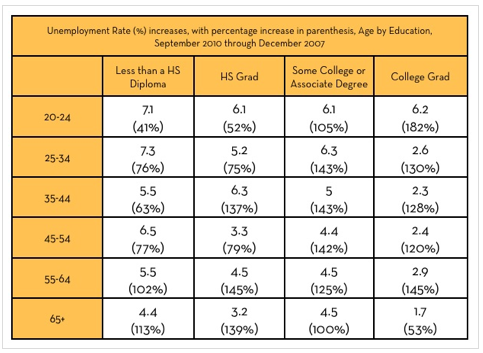No, Our Excess Unemployment Today Is Not Structural

In three years, however--unless the Federal Reserve or the Obama administration take much stronger action than they are currently contemplating--it will be.
Mike Konczal:
The Young, the Old, the Unemployed: Roosevelt Institute intern Charlie Eisenhood dug up this data on the unemployment rate by age and education.... September 2010.... December 2007 when the recession started.... Here is the difference between the two, along with the percent increase....
What jumps out for me? College educated 20-24 year olds have the highest percentage increase in unemployment. This should go against a structural unemployment story, as college educated people have the ‘freshest’ skills and incredibly high mobility. It’s worth pointing them out in particular because if their careers hit a rough spot, hysteresis sets in and they’ll have serious wage losses years down the road (see this classic White House blog post on the subject by Peter Orszag).
Their situation is also important because the crisis is often seen as a small deal for college educated workers.
The other thing that jumps out at me is that the unemployment rate for everyone 55-64 has more than doubled. One thing we aren’t talking about enough is that someone who is 60 and has been unemployed for a year isn’t going to find a decent job again. Other ways of looking at the labor search outcomes of 55-64 year olds are even more worrying. Why don’t we temporarily lower the retirement age, conditional on a bunch of hoops? Why don’t we give them some relief, rather than raising the retirement age (a subject likely to be at the center of the December debate), when 55-64 year olds have had such a large increase in unemployment?



J. Bradford DeLong's Blog
- J. Bradford DeLong's profile
- 90 followers



